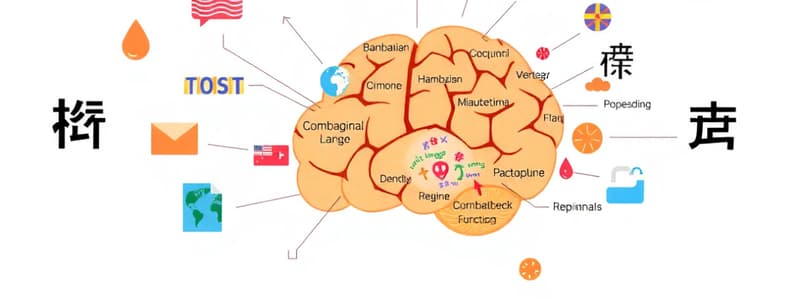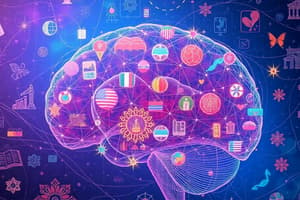Podcast
Questions and Answers
Match the following brain-related facts with their descriptions:
Match the following brain-related facts with their descriptions:
Weight of the brain = Three pounds Comparison to pineapple = One pound more than a pineapple Power of the brain = Responsible for processing language Language processing = Involves speaking, hearing, and understanding
Match the incorrect beliefs about the multilingual brain to their corrections:
Match the incorrect beliefs about the multilingual brain to their corrections:
Separate parts for each language = Languages share the same areas of the brain Limit to the number of languages learned = There is no limit to language learning Dominance of native language = New languages compete with the native language Management of multiple languages = The brain becomes flexible in language use
Match the benefits of being multilingual with their explanations:
Match the benefits of being multilingual with their explanations:
Connects you to different communities = Native language connects to family and culture Benefits in learning English = Using native language to understand new words Cognates = Words that look and sound similar in multiple languages Cultural connection = Engagement with teachers and friends in the current community's language
Match the following terms with their definitions related to language:
Match the following terms with their definitions related to language:
Match the challenges of switching languages with their potential impacts:
Match the challenges of switching languages with their potential impacts:
Match the following countries to their cultural connections from the content:
Match the following countries to their cultural connections from the content:
Match the different languages to the corresponding cognate of 'bicycle':
Match the different languages to the corresponding cognate of 'bicycle':
Match the following points with their significance in multilingualism:
Match the following points with their significance in multilingualism:
Match the following concepts about language in the brain with their implications:
Match the following concepts about language in the brain with their implications:
Match the following statements about language processing to their meanings:
Match the following statements about language processing to their meanings:
Flashcards are hidden until you start studying
Study Notes
Connection Between Brain and Language
- The human brain weighs approximately three pounds, only slightly heavier than a pineapple.
- Responsible for processing, speaking, hearing, and understanding language.
- Being multilingual leads to notable changes in brain structure and function.
Language Processing in the Brain
- Initially believed that separate brain areas were responsible for each language; this has been disproven.
- There is no limit to the number of languages a person can learn; all languages share the same brain regions.
- The brain adapts by expanding language-related areas to accommodate new languages.
- Multilingual individuals may experience competition between languages, with the native language often being more dominant initially.
Language Switching: Benefits and Challenges
- Speaking multiple languages connects individuals to diverse communities and cultures.
- Native language fosters familial and cultural ties, while the community's language enhances social connections.
- Multilingualism can aid English learners by allowing them to leverage their native language for understanding new concepts (e.g., cognates).
- Example of cognates: "bicycle" in English corresponds to "bicileta" in Spanish and Portuguese, "bisikleta" in Tagalog, and "bisiklet" in Haitian Creole.
- Frequent language switching can lead to difficulties in using one language exclusively, causing frustration for some individuals.
- Personal anecdote: Andres Ortega Cruz experiences challenges in using only one language due to habitual switching between Spanish and English.
- The multilingual brain is characterized by greater flexibility and the ability to manage multiple languages seamlessly.
Studying That Suits You
Use AI to generate personalized quizzes and flashcards to suit your learning preferences.




